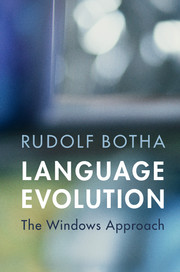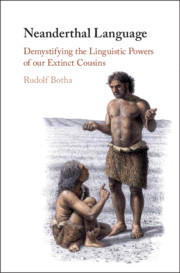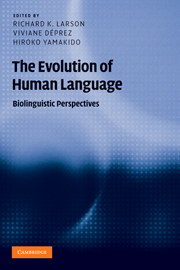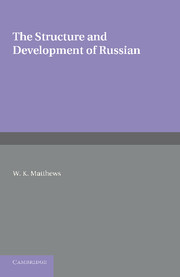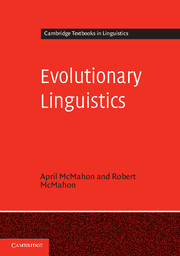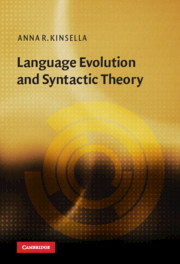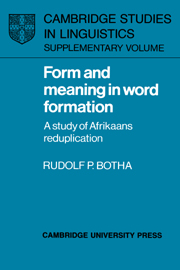Language Evolution
The Windows Approach
Part of Approaches to the Evolution of Language
- Author: Rudolf Botha, University of Stellenbosch, South Africa
- Date Published: May 2016
- availability: Available
- format: Paperback
- isbn: 9781316501078
Paperback
-
How can we unravel the evolution of language, given that there is no direct evidence about it? Rudolf Botha addresses this intriguing question in his fascinating new book. Inferences can be drawn about language evolution from a range of other phenomena, serving as windows into this prehistoric process. These include shell-beads, fossil skulls and ancestral brains, modern pidgin and creole languages, homesign systems and emergent sign languages, modern motherese, language use of modern hunter-gatherers, first language acquisition, similarities between language and music, and comparative animal behaviour. The first systematic analysis of the Windows Approach, it will be of interest to students and researchers in many disciplines, including anthropology, archaeology, linguistics, palaeontology and primatology, as well as anyone interested in how language evolved.
Read more- The first principled account of the Windows Approach to the study of language evolution
- Offers a survey of recent literature on language evolution across the social and biological sciences
- Accessibly written, with explanations of technical terms and ideas
Reviews & endorsements
'In 2006, Rudie Botha launched an all out attack on the legitimacy of the claim that the South African archaeological site of Blombos had evidence of 'fully syntactic' language 75,000 years ago. No one has been able to counter the logic of his argument, and this book applies that same relentless, illuminating logic to other claims in the study of language origins. In doing so, Botha shows just how carefully any claims must be justified, and just how powerful his Windows Approach is. Students and researchers in archaeology, primatology, linguistics, and comparative ethology cannot ignore this book.' Iain Davidson, University of New England
See more reviews'This book will prove to be a milestone in the field … a meticulous, rigorous, and yet highly readable guide.' Paul T. Roberge, University of North Carolina, Chapel Hill
Customer reviews
Not yet reviewed
Be the first to review
Review was not posted due to profanity
×Product details
- Date Published: May 2016
- format: Paperback
- isbn: 9781316501078
- length: 230 pages
- dimensions: 227 x 152 x 20 mm
- weight: 0.48kg
- contains: 13 b/w illus.
- availability: Available
Table of Contents
Part I. Preliminaries:
1. The Windows Approach
2. Conceptual foundations of the approach
Part II. Correlate Windows:
3. Sea shells, ancient beads, and Middle Stone Age symbols
4. Fossil skulls and ancestral brains
Part III. Analogue Windows:
5. Incipient pidgins and creoles
6. Homesign systems and emergent sign languages
7. Modern motherese
8. Hunter-gatherers' use of language
9. Language acquisition
Part IV. Abduction Windows:
10. Modern music and language
11. Comparative animal behaviour
Part V. Epilogue:
12. A tool fit for demystifying language evolution?
Sorry, this resource is locked
Please register or sign in to request access. If you are having problems accessing these resources please email [email protected]
Register Sign in» Proceed
You are now leaving the Cambridge University Press website. Your eBook purchase and download will be completed by our partner www.ebooks.com. Please see the permission section of the www.ebooks.com catalogue page for details of the print & copy limits on our eBooks.
Continue ×Are you sure you want to delete your account?
This cannot be undone.
Thank you for your feedback which will help us improve our service.
If you requested a response, we will make sure to get back to you shortly.
×
